As Chile’s New Constitution Faces Uphill Battle, Artists & Communities Paint ‘Murals for Approval’
04:47 GMT 29.08.2022 (Updated: 10:57 GMT 11.03.2024)
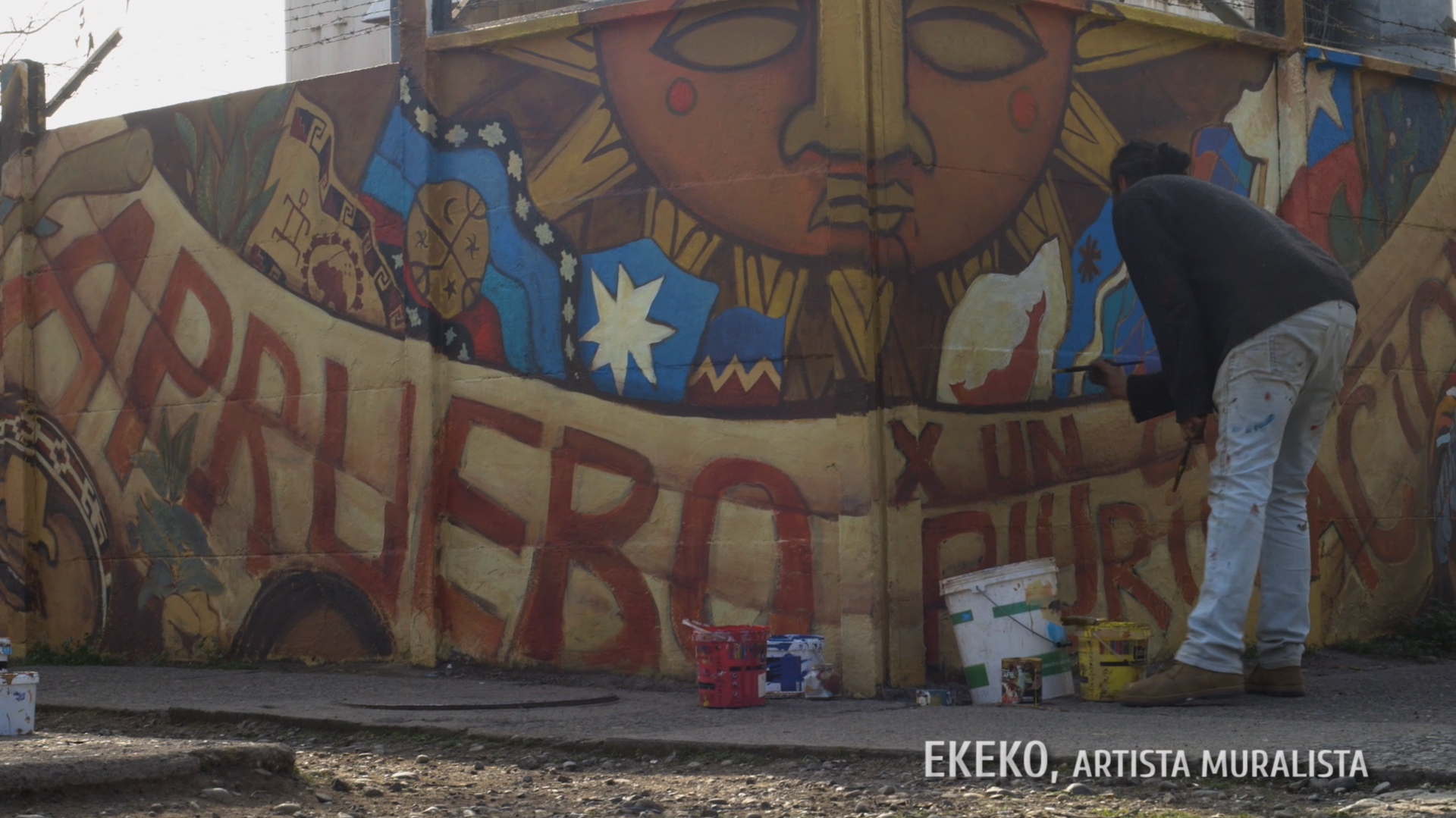
© Álvaro Gauna, @alvarogaunac
Subscribe
After years of struggles and the 2021 election of the country’s first progressive-leaning president, less than a week remains before Chileans head to the polls to decide whether to approve a new constitution. Polls in the country are notoriously unreliable, but recent surveys suggest proponents of the constitution may have some ground to make up.
To find out more about the fight for Chile’s future, Sputnik News spoke with Ekeko. The Santiago-based Chilean-American painter is one of a dozen artists who worked with communities across the country in recent weeks to design and install “Murals For Approval” encouraging Chileans to cast their vote in favor of a new constitution.
Describing the upcoming election as a chance for the country to make a clean break with its Pinochet-era past, Ekeko claimed a legal requirement that all eligible citizens vote next week is likely to turn the tide in favor.
Sputnik: Ekeko, thank you so much for joining us tonight. Where did the idea for a new constitution come from? How is it different from the previous constitution, and what are its chances of passing now?
Well, we're in Chile right now. We're in a very, very interesting situation. It's a historical moment for us on the 4th of September. That is, in seven days, we're going to go to one of the most important elections that has happened in the last, I would say, maybe 50 years, maybe more.
Well, personally, I think after the election of Salvador Allende, on the 4th of September by the way, in 1970, this is probably the most important moment for us.
We are going to vote. It's actually the final vote because we already had the first vote start when the group that wrote the Constitution was formed, we did a formal election. And this time it's just to approve (or to not approve) the Constitution that is proposed, that was written by the constitutional convention.
— Murales por el Apruebo (@ElMurales) August 25, 2022
So this started out, what, three years ago, in 2019. A group of students, of school students, started a protest because of the rise of the ticket on the metro system. So it was just $30, which is not very much. But, you know, everybody here felt it was like the straw that broke the camel's back. Right? It was too much. We had had too much.
And the protests just really exploded. So the military came in and started to shoot. And the army, because police forces were not able to control. And a whole movement started. It was the biggest protest that has happened in Chile in the last, like I say, maybe 30 or 40 years. Maybe the protests during the dictatorship could be sort of equivalent.
But in 2019, between the 19th of October and around the middle of November, more than 40 people were killed. More than 500 people had their eyes mutilated because of the rubber bullets that were shot by the police and the military.
I think it was the 15th of November. The political groups that are still in power, in one or another way, proposed an entirely new constitution, or at least to start a process where we could obtain a new constitution.
So this whole process - I'm not going to go into detail about all of it - has come out with a proposed constitution. It is an incredible document for us as Chileans, because, for example, it's unique in all the world.
We elected 155, I think, delegates. Yeah. None of them were senators or deputies or had important political privileges in the country. Half of them were women and half of them were men, which was incredible, I mean, not only for Chile, but for most of the world – having this type of group, you know, that is so democratically elected.
We had reserved seats for indigenous people. Chile has about 10% indigenous people and they were represented as they have never been before. Chile has a very, very difficult history and a very conflicted history with Mapuche people, with Aymara.
There were whole peoples down south that were genocided at the beginning of the 20th century. So, it's a very sad and it's a very difficult relationship, which we are now starting to repair very slowly. And that is, of course, if the Constitution is approved.
Sputnik: If I may, how exactly will this new constitution do that? Can you describe some of the substance of the new proposed constitution?
How would it impact indigenous relations, social relations and economic relations? Environmental relations? How would it impact all of these important aspects of life for so many Chilean people?
Well in many different ways. I mean, the Constitution, of course, it is the document that sort of… it's the compass of the direction the country will be going in for the next 50 years.
For very important things like health, you know, health and everything until all the fundamental rights of people were sold away in the past 40 years. So the state sort of just stood by, you know, and everything was done through private corporations.
And your health rights were [only] if you could pay for it. I mean, and if you can't pay for the hospitals in Chile, if you get sick or whatever… I have a friend that got sick in his liver and waited for six years for some type of operation. He died waiting because he didn't have the money to operate to do the transplant of his liver, for example.
The right for dignity for work. There's a word that we have been using for the past four years that is so important: dignidad, dignity. You know, to have work with dignity. And I think that word has been... Like, through all the struggles we have.
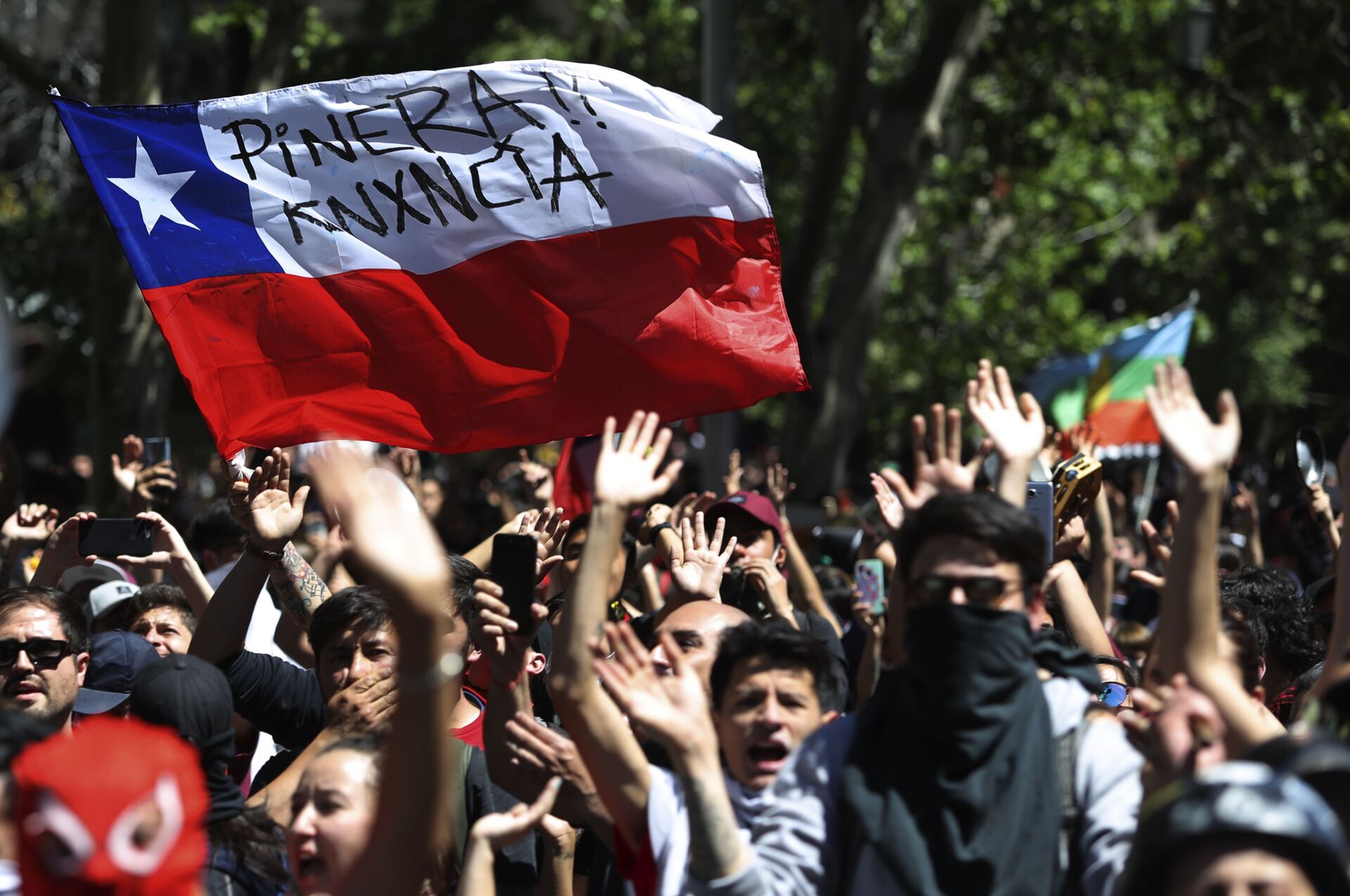
Protesters wave a Chilean flag, marked with a message that reads in Spanish: "Pinera quit" during a demonstration in Santiago, Chile, Monday, Oct. 21, 2019.
© AP Photo / Miguel Arenas
In fact, the main place where people came together for the protest is called Plaza Dignity, that was formerly called Plaza Italia.
So like, for example, what else? The… retirement.
Retirement has been like people have been assaulted by private corporations until right now. You are forced to give part of your salary to these [Chilean pension administration] AFP, which are private corporations that sort of invest your money.
And we were told that was the best way we could invest our money. And so everybody has to give, what is it? I think 10%, 5% of what we earn, and then people that have not been able to save enough are receiving the most miserable retirement [payments], like 150,000 pesos.
What is that? That's like... That is like $200 per month for old people. They cannot live on that money. So, those are just a couple of things we're talking about.
Sputnik: How, specifically, though, would the Constitution change that?
Well, what is proposed in the Constitution for retirement is that the state will have the obligation to guarantee that older people will be treated with dignity. They will not be mistreated. They will have enough money to live their life as they have been living. And they will have… It's just miserable, the amount of money that they're receiving now.
So it's going to be what is proposed is a national fund for retirement, which was the way it worked before the dictatorship. And it worked a lot better because people received better retirement. Right now, it's just, it's not right.
And for other things, like, for example, a big thing, a fundamental right that's going to be included in the Constitution is the right to water.
It sounds sort of strange, but when water is a private thing, you can buy all the water you want. And if you don't have money to buy water, you just don't have water.
And it has been a very, very significant issue in the region of El Paraiso, for example. Many farmers just lost everything because the big corporations that had holdings of water just sucked it all out.
Mining companies also do the same. They destroy the whole ecosystem. And that is going to change. There are families, maybe seven or eight families that use up almost all the water of the country. It's just incredible. That is going to change.
Another fundamental right, for example, is education. Education in Chile, it's just the same criteria before. If you don't have the money, you couldn't go to school.
Of course, there's public education for the kids, right? Until university. But public education, it's just terrible. I mean, it has been a very, very, very, very bad education.
So, in fact, the biggest protests before 2019 were all students protesting because they wanted free education and they wanted education of quality, which is not the way it was. So yeah, I don't know if I can go into every detail of the new constitution because it's incredibly detailed. But those are the main things that I see.
Sputnik: If you could sum it up into one or two sentences?
Well, this is a constitution that is made for everybody and by, of course, a much more democratic group. The Constitution in 1980 was written by four [people]. I'm not going to go into what I think about these people, but four guys that were just... They were put there by [Chilean dictator Augusto] Pinochet, you know? Four men, of course. And they wrote it all.
And people went to the elections, right? But the elections were not... they were questioned internationally. People got threatened. Because, for example, if you voted, the military would cut your document, your identity documents to make sure that you voted, which was not, of course, right.
And this constitution that we have today is so different. It is so different. It is the Constitution that gives hope. And it's an inclusive constitution. It's going to give power to people that have not had power, ever, ever.
There has never been a constitution written in Chile, truly democratically. They have all been written by groups, very small, powerful groups. It has to do with the political elites. And this is for the first time, a great, great opportunity for us and Chile.
Sputnik: I'd like to discuss a little bit more in depth the project that you guys are working on: Murales por el Apruebo, Murals for Approval.
How do these murals reflect the substance of the proposed constitution, the kinds of changes, radical changes that you were discussing with me? And why did you and so many of your colleagues, so many other artists feel compelled to speak out about this in support of the new constitution?
Well, we came up with this project with a group of muralists. Chile has a long history of muralism, street muralism, and it has a very political sense in it.
We decided that the moment we were leaving – we are leaving now – was so important that we could not just stand aside and see it happen, but we had to participate in the way that we know how, which is painting.
So we came up with an idea – we divided between 12 artists, 12 different subjects - that we thought were very important in the new Constitution. Like what I was saying before, the right to water, the right to have different nationalities [recognized] inside one same country, the right for housing, education, or other things, like ‘how are we going to see democracy in a new way,’ which is another theme we thought was important. Responsible economy. ‘Okay, how are we going to… live in a new way?’
Also, the rights that nature has, you know, in the Constitution in 1980, we had, you know, everything was focused on humans, we'll say, or a group of humans.
But now nature is going to have – Mother Nature is going to have rights. So that's a very different thing. And we thought that was very important.
So each one of us, in different regions and cities of Chile, got together with a different organization, social groups, or neighbors. And we started to do these murals. We had no money at all. Nothing. We really looked everywhere to get some type of funding. It was not possible.
But finally, we found a little bit and we decided to do… We, I mean, every one of us has a little paint. You know, in the back of my house, I have some paint that's left over from different murals.
So everybody just gave that away. I mean, gave it to the project. And the little money we could come up with, we decided to invest it in videos. You know, a good filming of the different murals. So we started out with that and it was great. It was really great [to be] finishing. Now I think the last two murals we're doing are going to finish today and tomorrow.
It was just very, very beautiful how people felt compelled to help out to paint with us. We had murals with kids in different places in Chile, in very different places.
Myself, I painted a mural with indigenous groups in South Santiago. So it was called ‘We Newen Association.’ They are Mapuche from Urban Santiago. In fact, most Mapuche now, the majority, live in big cities. So they are very important organizations of Mapuche in Santiago and in Temuco, which is the biggest city in the south.
So, yeah, it was really interesting. The way we started was talking with people about, for example, this subject. My subject was 'Chile Plurinacional' and just hearing, talking and hearing about what people thought about... How they felt that the new constitution was picking up all the things that have been so neglected for so, so long.
And they talked a lot about respect, you know, how they are for the first time after October 2019, are feeling respect. They are feeling that they are being recognized for the first time in a positive way.
Mapuche people are the poorest people in Chile right now. And not only is that like an economic poverty, but, for example, when we spoke before the mural with them, they told me a lot about how it was to be in school in Santiago having a Mapuche last name, and how they got bullied.
Many of them thought about changing their names - that has changed in the past three years after the revolts of 2019.
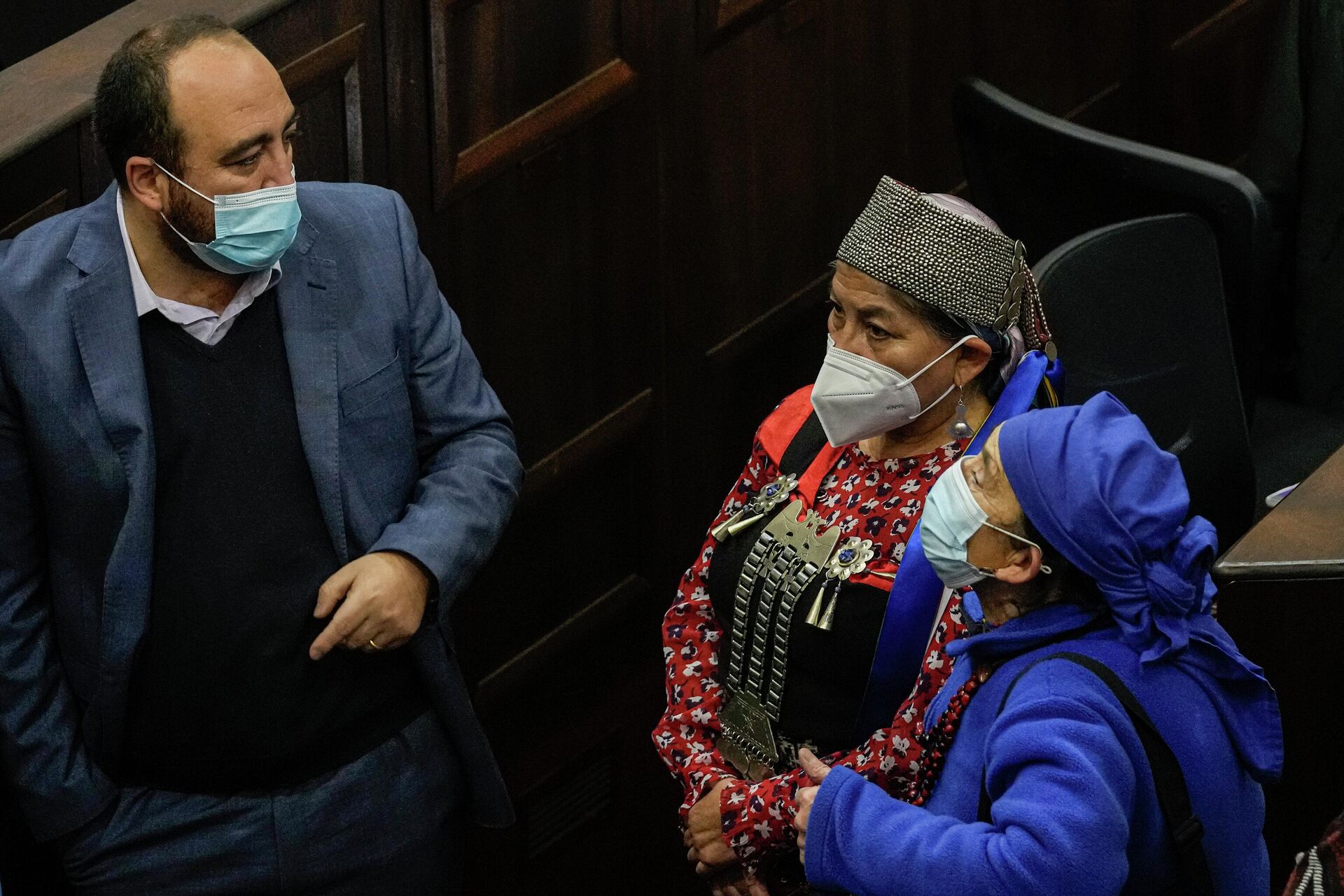
Indigenous Mapuche Constituent Assembly representative Elisa Loncon, center, and Francisca Linconao talk with fellow representative Fuad Chahin prior to the vote on the constitutional reforms in the Chilean Constitutional Convention at the former National Congress in Santiago, Chile, Thursday, June 2, 2022.
© AP Photo / Esteban Felix
For example, the flag that was most seen during the 'return' [to democracy] was the Mapuche flag, even used by people that do not identify as Mapuche. But it's like the symbol of an oppressed people that for the first time are gaining respect.
And that was what came out in the mural that we did with ‘We Newen,’ and they helped paint and all that. Of course, I came up with the drawings after hearing and after talking with them.
A meeting in Mapuche culture is called “Trawün.” And it's not only about talking, but it's also very ceremonial. You share food and you listen and you talk. And that's what we did.
It came out really beautiful. The process was really nice with them and that was the way it worked with all the murals. Of course, with different groups of people.
Right now, my colleague, Patricio Albornoz, he's painting in a hospital in … Cerro Navia, a very poor area in Santiago. He's there painting with the union of workers of the hospital, and it's about the right to good health, public health. And the workers are helping out the nurses, the ambulance drivers, everybody.
That's what we think that muralism, street muralism, is about. It's about, you know, putting art in the life of people in the street, in the common spaces that we live in.
Sputnik: I'd like to hear, you know, how people have responded, if you've heard anything from people you've talked to. And then I'd also like to talk about the response from the mass media and the political elites. Because when you spoke previously, you had some pretty powerful words about what they were doing in their efforts to prevent this new constitution from going through. So if you could speak on either of those issues, it'd be much appreciated.
Sure. Well, doing art on the street is, in that way, it's wonderful. Because you get to speak to so many people, people that go by, people that ignore you, of course.
But there's a lot of people that stop and want to tell you their impressions, right? They can say, well, maybe they can say they hate your mural or maybe they just want to know more about you, ‘what are you doing? I mean, why aren't you working like everybody?’
I mean, things that can happen like that. A lot of children stop saying, you know, ‘what is this about?’ And so it's a great way to talk to people, to get close to the community also. Because we paint with the community so the neighbors are painting there.
It really makes a lot of debate, I would say. And that's what it's about. For many years, like you say, mass media has been - and still is - the private property of [financial] groups. And they have decided for so many years what the public should listen to and read and look at. And we have never been there.
They're not interested in this type of story, you know, and the way it has been in the past … couple of months after the convention finished the proposed document? They have lied so much. They have put so much false information in the news because they know they cannot defend their position. It's just so anti-democratic.
Sputnik: So what do they say? What is it that they say? It may very well be, you know, lies and anti-democratic, but what is their argument? What are the kinds of things that they're saying are going to happen if this constitution goes through?
For example, they cannot stand that Mapuche people will have the same rights or even have like a different justice system. Mapuche people have their own society and they have been here, I don't know, thousand years before the Spaniards arrived.
They have a culture. And although it's not like they're going to have a different country and live like an autonomous [society, the Chilean mass media] have said that 'we are going to divide the country.' That 'there's going to be like different types of citizens.' And that's not true.
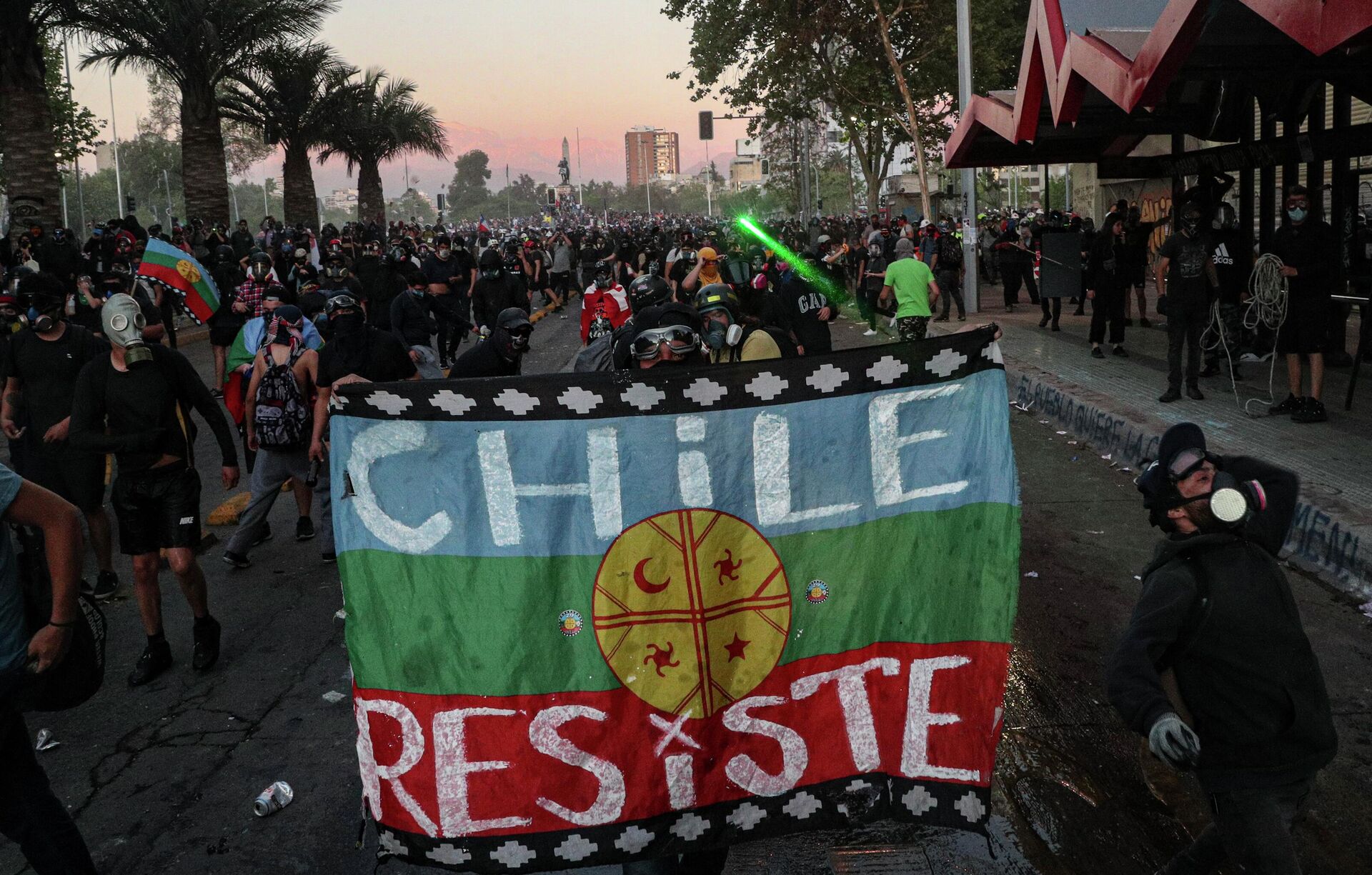
An anti-government protester holds a Mapuche flag during a demonstration against police after an officer was accused of allegedly pushing a youth off a bridge during a previous protest in Santiago, Chile, Friday, Oct. 9, 2020.
© AP Photo / Esteban Felix
I mean, the way we're thinking about this is Canada or New Zealand, where this type of things have been settled in a different way, much better than what is happening, what has happened here.
Right now, there is a war. Down south, Mapuche people are being sent to jail. There are [racial profilings] done by the police constantly. And it's so violent. So violent. And nobody cares about that because they're not white Chileans.
So, another thing they say, for example, is that kids – that their parents – won't be able to choose which schools they want to send their children to. That's a lie. It's just not true.
They say that the state will steal your savings for your retirement. You know, that sort of stuff. It's just things that they don't know how to defend [against] in another way.
And in fact, many of the murals that have been painted by us and by other groups – we're not the only ones that are painting murals in Chile – have been attacked and they're throwing black paint on them.
They do not know how to create. They don't. There's no artists with the rejection campaign. I mean, so what they do is they destroy and they intimidate. They go around, beat up people.
Just, what was it, four or five hours ago? A wagon with a horse just ran over four bicycle riders in downtown Santiago. Because the man that was on this wagon decided that he was against the new constitution. It's just crazy. And that's happening right now in Chile.
So, yeah, we have a very, very violent right wing and they are very afraid of losing their power. Power that they obtained through blood, and during the dictatorship.
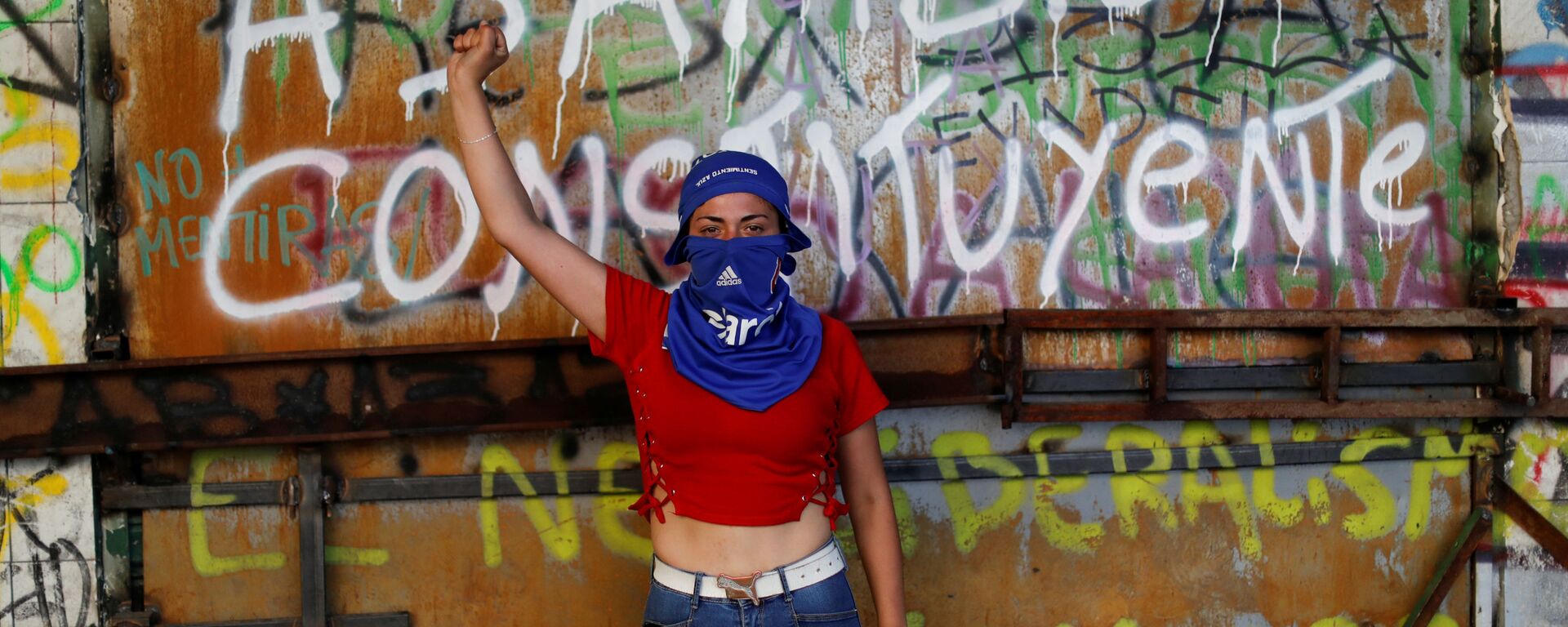
19 November 2019, 21:15 GMT
They are willing to do crazy things, [which] we hope will not get too bad before the elections. I mean, we hope it doesn't go too crazy. And I'm sure, although we don't have any certain numbers, that the approval will win. … Because this will be the first time that the voting will be an obligation for everybody. And that could change everything.
So a lot of young people, poor young people, will go out to vote next Sunday. And I think that that will change the whole situation, I hope. I really hope we win by a long, far reach.
Because that will guarantee more possibilities… just to demonstrate that we have the power to do that and that the Constitution will be approved by a lot of people. That's what we need. Next Sunday.
And I really hope that that happens. It's so important for us, so important, not for me, Wyatt–it's not about me. It's not about my wife. It's about my children. It's about my grandchildren, and how we are going to give them a country that will be more democratic, [and] will be a fairer country.
We're going to give opportunities to people that have not had a fair game ever. So I think that's so important, and that's what this is all about.
And as an artist and as artists in Chile, we believe that that's our stand. We have to be with the new constitution, because that is the way to give this country a new future.
